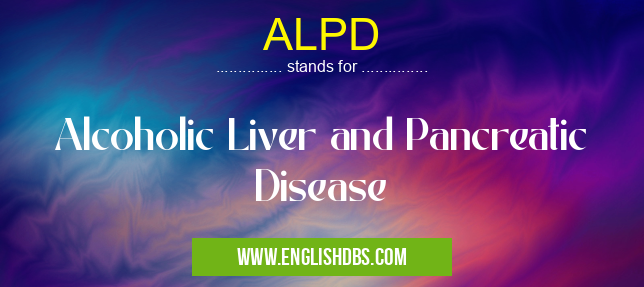What does ALPD mean in DISEASES
ALPD, an abbreviation in the MEDICAL field, stands for Alcoholic Liver and Pancreatic Disease. It refers to a condition that affects both the liver and pancreas due to chronic and excessive alcohol consumption. Long-term alcohol abuse can lead to inflammation, damage, and dysfunction of these vital organs.

ALPD meaning in Diseases in Medical
ALPD mostly used in an acronym Diseases in Category Medical that means Alcoholic Liver and Pancreatic Disease
Shorthand: ALPD,
Full Form: Alcoholic Liver and Pancreatic Disease
For more information of "Alcoholic Liver and Pancreatic Disease", see the section below.
Symptoms of ALPD
ALPD can manifest in a range of symptoms, including:
- Liver damage: Jaundice, abdominal pain, swelling, fatigue
- Pancreas damage: Abdominal pain, nausea, vomiting, weight loss
- General symptoms: Loss of appetite, malnutrition, fatigue, confusion
Causes of ALPD
The primary cause of ALPD is chronic alcohol abuse. Alcohol consumption in excess can cause inflammation and damage to the cells of the liver and pancreas. Over time, this damage can lead to scarring, impaired function, and the development of ALPD.
Diagnosis of ALPD
Diagnosing ALPD typically involves a thorough medical history, physical examination, and laboratory tests.
- History: Assessing alcohol consumption patterns and duration
- Physical exam: Checking for signs of liver and pancreatic damage
- Blood tests: Measuring liver enzymes, bilirubin, and pancreatic enzymes
Treatment for ALPD
The cornerstone of ALPD treatment is abstinence from alcohol. Once alcohol consumption is stopped, the liver and pancreas can begin to heal and regenerate. Other treatment approaches may include:
- Liver damage: Medications to manage symptoms and slow disease progression
- Pancreas damage: Enzyme supplements, pain relievers, and insulin therapy
Essential Questions and Answers on Alcoholic Liver and Pancreatic Disease in "MEDICAL»DISEASES"
What is Alcoholic Liver and Pancreatic Disease (ALPD)?
ALPD is a condition that affects both the liver and pancreas due to excessive alcohol consumption. Chronic alcohol abuse damages these organs, leading to inflammation, scarring, and impaired function.
What are the symptoms of ALPD?
Symptoms of ALPD can vary depending on the severity of the condition. They may include:
- Abdominal pain
- Jaundice (yellowing of the skin and eyes)
- Weakness and fatigue
- Nausea and vomiting
- Weight loss
- Confusion and disorientation
- Increased thirst and urination
How is ALPD diagnosed?
ALPD is diagnosed through a combination of methods, including:
- Medical history and physical exam
- Blood tests to assess liver and pancreatic function
- Imaging tests, such as ultrasound or CT scan, to examine the organs
- Biopsy of the liver or pancreas to confirm the diagnosis
What are the risk factors for ALPD?
The primary risk factor for ALPD is chronic alcohol abuse. Other factors that may increase the risk include:
- Family history of liver disease
- Obesity
- Diabetes
- Certain medications
How is ALPD treated?
The primary treatment for ALPD is to stop drinking alcohol. Additional treatments may include:
- Medications to reduce inflammation and protect the liver
- Nutritional support to restore lost nutrients
- Liver transplant in severe cases
What are the complications of ALPD?
Complications of ALPD can include:
- Liver failure
- Pancreatic failure
- Esophageal varices (enlarged veins in the esophagus)
- Ascites (fluid accumulation in the abdomen)
- Encephalopathy (confusion and disorientation)
Can ALPD be prevented?
The best way to prevent ALPD is to limit alcohol consumption or avoid it altogether. Other preventive measures include:
- Maintaining a healthy weight
- Controlling diabetes
- Avoiding certain medications that can damage the liver
Final Words: ALPD is a serious condition that can have a significant impact on an individual's health and well-being. Understanding the causes, symptoms, and treatment options for ALPD is crucial for early detection, intervention, and prevention. By recognizing the risks and consequences of excessive alcohol consumption, we can promote responsible drinking habits and reduce the incidence of ALPD and related health problems.
